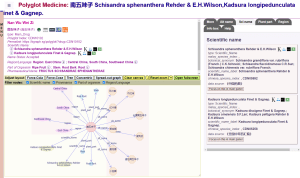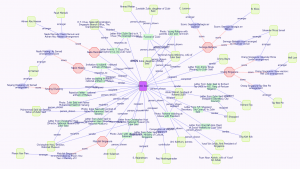Book chapter: Pedagogies of artistic tradition and heritage
Khoo, C.S.G., & Tan, E.A.L. (2025). Codetta: Pedagogies of artistic tradition and heritage. In R.Y.P. Kan & C.S.G. Khoo (Eds), Signature pedagogies for professions in arts and design: Issues, methods, contexts, practices (Chapter 11, pp. 177-183). Springer. https://doi.org/10.1007/978-981-96-2616-8_11 Abstract. Pedagogies of artistic tradition and heritage advocate for using online archives and collections to support self-regulated learning, creative inspiration, and the development of artistic voice and identity. Rather than static repositories, archives can function as living collections that are continually re-enacted to generate new experiences and understanding as records of performances and commentaries are added. This codetta reflects on the nature of archives relating to music and performance, and their possible use in the education of aspiring arts professionals and in inspiring future creative works. The use of archives to support a pedagogy of artistic tradition and heritage is at a nascent stage, as is the development of archives information...
Book chapter: Knowledge graph system for digitised archival collections
Khoo, C.S.G., & Tan, E.A.L. (2025). Knowledge graph system for digitised archival collections: Learning from the life, work and times of past masters. In R.Y.P. Kan & C.S.G. Khoo (Eds), Signature pedagogies for professions in arts and design: Issues, methods, contexts, practices (Chapter 10, pp. 149-175). Springer. https://doi.org/10.1007/978-981-96-2616-8_10 Abstract. This chapter discusses an underutilised resource in arts educational institutions that have a significant history: their archival collections, including the personal archives of famous artists and musicians who taught at the institution, were trained there, or were otherwise associated with the institution. The kinds of knowledge, insights and narratives that can be derived from such archival collections are examined. The authors propose knowledge graph as a suitable knowledge organisation scheme for representing items in the personal archives and their inter-relationships as well as links to concepts and resources on the Web. Three approaches to developing a knowledge graph are illustrated...
Book (Open Access): Signature pedagogies for professions in arts and design
Kan, R.Y.P., & Khoo, C.S.G. (Eds). (2025). Signature pedagogies for professions in arts and design: Issues, methods, contexts, practices. Springer. https://doi.org/10.1007/978-981-96-2616-8 (Open Access) Extracts from the Introduction : Signature pedagogy is a multifaceted concept developed by Shulman (2005a & 2005b) and his colleagues at the Carnegie Foundation for the Advancement of Teaching for analysing and characterising pedagogical methods and educational programmes that prepare students for particular professions. The abstract and multifaceted nature of the concept provides a rich framework for analysing pedagogical methods deeply, identifying their core characteristics and their relation to professional thinking, practice and attitudes. This exploration of professional arts and design education is carried out in the context of a premier arts education institution in Singapore—the Nanyang Academy of Fine Arts (hereafter NAFA), one of two constituent institutions of the University of the Arts Singapore. … As each chapter examines particular educational methods, concepts and...
Enhancing public campaign messages: The power of causal arguments
Pian, W., Zheng, R., Chi, J., & Khoo, C.S.G. (2025). Enhancing public campaign messages: The power of causal arguments. Information Processing & Management, 62(4), 104160. https://doi.org/10.1016/j.ipm.2025.104160 Abstract: Campaign messages are often issued by government and international agencies to persuade the public to adopt certain standpoints or take actions related to public issues. However, there is a paucity of empirical research investigating how to improve the messages to increase adoption—from an information and argumentation perspective. This study developed a model of public campaign message adoption based on an argumentation perspective and the information adoption model, and investigated how different types of causal argument elements contribute to the adoption intention of public campaign messages. Two within-subject online experiments with fictitious and real scenarios were conducted, and Bayesian hierarchical modeling that treated participant and scenario as random factors were employed in the data analysis. The results indicate that two types of argument...
Conference paper: Development of the Polyglot Asian Medicine Knowledge Graph system
Khoo, C.S.G., Stanley-Baker, M., Zakaria, F.B., Chen, J., Ang, S.Q.R., & Huang, B. (2023). Development of the Polyglot Asian Medicine Knowledge Graph System. In D.H. Goh, S.J. Chen, & S. Tuarob (Eds.), 25th International Conference on Asia-Pacific Digital Libraries, ICADL2023 (Lecture Notes in Computer Science, vol 14458, pp. 3-11). Springer. https://doi.org/10.1007/978-981-99-8088-8_1 Abstract: The Polyglot Asian Medicine system hosts a research database of Asian traditional and herbal medicines, represented as a knowledge graph and implemented in a Neo4j graph database system. The current coverage of the database is mainly traditional Chinese medicines with some Malay and Indonesian data, with plans to extend to other Southeast Asian communities. The knowledge graph currently links the medicine names in the original and English languages, to alternate names and scientific names, to plant/animal parts they are made from, to literary and historical sources they were mentioned in, to geographic areas they were associated with,...
Article: Knowledge graph visualization interface for digital heritage collections
Khoo, C.S.G., Ng, S.G., Chan, C.F., Stanley-Baker, M., Tan, E.A.L., & Cheng, W.N. (2024). Knowledge graph visualization interface for digital heritage collections: Design issues and recommendations. Information Technology and Libraries, 43(1). https://doi.org/10.5860/ital.v43i1.16719 Abstract: Digital heritage portal interfaces are generally similar to digital library and search engine interfaces in displaying search results as a list of brief metadata records. The knowledge organization and search result display of these systems are item-centric, with little support for identifying relationships between items. This paper proposes a knowledge graph system and visualization interface as a promising solution for digital heritage systems to support users in browsing related items, understanding the relationships between items, and synthesizing a narrative on an issue. The paper discusses design issues for the knowledge graph, graph database, and graph visualization, and offers recommendations based on the authors’ experience in developing three knowledge graph systems for archive and digital humanities resources...
Polyglot Medicine Knowledge Graph
The Polyglot Medicine Knowledge Graph system is launched: https://kgraph.sg/polyglot. This is a project to develop a database of Asian traditional and herbal medicines. Current database coverage is mainly on Chinese traditional medicines, expanding to Malay and Southeast Asian traditional medicines. The knowledge graph currently links the medicine names in the original and English languages, to alternative names and scientific names, to plant/animal parts they are made from, to literary and historical sources they were mentioned in, to geographic areas they were associated with, and to external database records with information on them. There are plans to link the medicines to pharmacological information later....
Article: Information and argument patterns in the Introduction sections of sociology research papers
Cheng, W.-N., & Khoo, C.S.G. Khoo. (2022). Information and argument patterns in the Introduction sections of sociology research papers. Iberica, 44 (December), 127-154. https://doi.org/10.17398/2340-2784.44.127 Abstract. This study analyzed the information-argument structure of the Introduction sections of sociology research papers, to identify differences across three types of sociology research: Investigative research, Development and Evaluation research, and Descriptive research. The information-argument analysis framework bears some resemblance to rhetorical structure frameworks following Swales’ CARS model, but focuses on the argumentative aspect of text and how information is used to support argument claims. The coding scheme specifies information types, subdivided into those that imply an argument claim and those that play the role of argument support. Seventy papers were sampled from ten sociology journals for analysis. Sequential association rule mining was used to identify sequential information-argument patterns. The study identified significant differences in information-argument profile across the three types of research papers, as...
Article: Information structures in sociology research papers: Modeling cause–effect and comparison relations in research objective and result statements
Cheng, W.-N., & Khoo, C.S.G. (2021). Information structures in sociology research papers: Modeling cause–effect and comparison relations in research objective and result statements. Journal of the Association for Information Science & Technology, 72(11), 1367-1385. Abstract. When writing a research paper, the author has to select information to include in the paper to support various arguments. The information has to be organized and synthesized into a coherent whole through relationships and information structures. There is hardly any research on the information structure of research papers, and how information structure supports rhetorical and argument structures. Thus, this study is focused on information organization in the Abstract and Introduction sections of sociology research papers, analyzing the information structure of research objective, question, hypothesis, and result statements. The study is limited to research papers reporting research that investigated cause–effect relations between two concepts. Two semantic frames were developed to specify the types of...
Explore a Zubir Said Knowledge Graph & Visualization
Version 1 launched in July 2021: https://ZubirSaid.sg The project seeks to develop a knowledge graph and visualization interface for the Zubir Said digital archive collection – as an example of applying knowledge graph technologies to digital heritage/archive content. Zubir Said was the composer of the Singapore national anthem and a pioneer songwriter in Singapore. The knowledge graph represents materials and content in Zubir Said’s personal archive as a network of concepts to support visualization, associative browsing, and research. Starting with a Musical Work (e.g., Majulah Singapura), compare different versions and arrangements (Music Score), check out different Performances, and view the related Item (audio/video/image/PDF file). Browse a social network of people with links to Zubir Said. Or Browse by genre – photos, letters, speeches, documents, commentary, news, documentaries. A text-based browse interface is also available....




